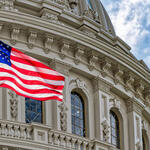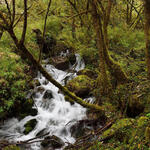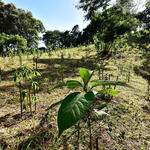- Date: 03 August 2022
- Author: Sheila Bonini, Senior Vice President, Private Sector Engagement
The recent news of a deal on a Congressional budget reconciliation package that includes unprecedented federal investment focused on climate change and clean energy is an opportunity that cannot be missed.
To understand the urgency around addressing the climate crisis, look no further than the frequent and extreme storms and unprecedent heatwaves that we are experiencing this summer due in part to human-caused global warming. These past few months have been a window into the more dire impacts of climate change we can expect unless we limit warming to 1.5° C (2.7° F) according to a recent report by the United Nations.
Leading businesses are doing their part to address climate change by setting ambitious climate goals and tackling their own emissions. In fact, more than five dozen of the U.S. Fortune 500 companies have set climate goals approved by the Science Based Targets initiative (SBTi). These are great first steps towards the global goal of halving emissions by 2030, but we need leadership from Washington to incentivize clean energy investment and supply chain decarbonization to achieve climate mitigation at scale.
- Date: 22 April 2022
- Author: Marcene Mitchell and Sheila Bonini
The Securities and Exchange Commission (SEC) recently announced a proposed rule that would require companies to include climate-related information in their regulated financial reporting, including in their annual 10-K statements. The climate-related disclosures would range from the company’s greenhouse gas footprint to climate risks and the strategies they are employing to mitigate the impact of climate change on their business.
WWF welcomes the SEC rule, particularly in light of the recent Intergovernmental Panel on Climate Change (IPCC) report, which makes clear the risk of inaction on climate change. The world has now reached 1.1°C of warming, and we’re already seeing enormous harm and damage to our communities, economy, human health, food and water security, and natural ecosystems. The report highlights the urgent need for a whole-of-society approach to staving off the worst effects of the climate crisis. The corporate disclosures required by the SEC’s proposed rule are an integral part of the solution.
- Date: 08 February 2022
Following the release of WWF's ReSource: Plastic Transparent 2021 report, we sat down with Lisa Morden, Vice President of Safety, Sustainability & Occupational Health at Kimberly-Clark, to discuss the company's involvement in the ReSource program, the importance of transparency, plus the greatest challenges and most promising solutions to the plastic waste crisis.
…
- Date: 26 October 2021
- Author: Linda Walker, Senior Director, Corporate Engagement, Forests
Today, HP announced an $80 million expansion of its forest conservation partnership with WWF to help restore, protect, and improve the management of nearly 1 million acres of forest around the world by 2030. With this next step in our decades-long relationship, HP now becomes WWF’s largest U.S. corporate partner.
There is an urgent need for business leaders to set and implement rigorous nature and climate targets and to meet them by investing in high-integrity nature-based solutions that put people and communities at the center. This move from HP raises the bar for what leadership looks like for corporate climate and nature commitments. As part of the company’s sustainability and climate strategy, HP is pledging to address the downstream impacts of its business on nature by taking action for forests at a level that considers all the paper that runs through its printers and print services by 2030, even if it’s not HP branded.
- Date: 26 October 2021
- Author: Anneliese Olson, HP Inc.
Here’s a challenge for you: Reflect on the places where you experienced life’s simplest pleasures. Do you imagine the scenic hike you took to get some steps in for the day? That park you took your kids to every Saturday morning? Or maybe even your own backyard?
It’s impossible for me to imagine being in any of my favorite places without trees, but beyond my personal enjoyment, forests are so important because they are home to three-quarters of the planet’s life on land and provide clean air and water. Forests are simply the best nature-based solution to address the climate crisis, and we must do what we can to protect them.
I’m fortunate to work at a company that understands the true value of forests both to its business and in the fight against climate change and knows the best way to make real impact is through partnership. HP Inc. and World Wildlife Fund (WWF) have been working together for over a decade to ensure that we are sourcing our paper products responsibly. Partnerships like this have helped HP reach many environmental milestones. HP brand paper has been deforestation-free since 2016, and in 2020, HP achieved zero deforestation for 99% of HP paper-based product packaging with the remaining 1% assessed to ensure reported fiber usage meets HP’s Sustainable Paper and Wood Policy.[i]
In 2019, HP and WWF joined forces to go beyond our sourcing and broaden our conservation efforts to help safeguard global forest ecosystems. In the past two years, we’ve been collaborating to restore part of Brazil's threatened Atlantic Forest and increase sustainable management of state-owned forest farms in China—with the aim of protecting a combined area of over 200,000 acres.
Brazil’s Atlantic Forest is a biodiversity hot spot, home to iconic wildlife like the jaguar and 7% of Earth’s plant species. But it has lost more than 83% of its original area. Partnering with landowners and local groups, WWF and HP are helping to restore critical areas of the Atlantic Forest. Since 2019, together we have engaged over 50 local institutions and 150 community stakeholders in the Serra do Mar, Mogi Guaçu, and Upper Paraná regions to secure their participation in forest restoration activities.
In China, WWF and HP are working with forest agencies and forest owners to pursue Forest Stewardship Council® (FSC®) certification under the new FSC-China national standard across 220,000 acres. China is one of the largest producers of paper products, yet it relies heavily on imported wood to meet demand, much of which comes from countries with high risk of deforestation. Improving forest management in China can help reduce pressure on threatened and high value forests. The partnership is providing training and technical support to forest managers of 462,000 acres of forestland to help improve forest management practices and enable the long-term success of FSC certification.
Ahead of the UN Climate Change Conference (COP26) this year, we announced a partnership expansion with WWF to counterbalance the amount of paper, regardless of brand, used in HP printers by conserving an equivalent number of forest resources.[ii] This builds on HP’s support of WWF’s development of science-based targets for forests. HP will be the first company to pilot a new methodology developed by WWF as part of its work on science-based targets for forests to more comprehensively estimate the impact on forests from non-HP paper that runs through HP printers globally. And then HP and WWF will protect, restore, and improve the management of a requisite amount of forests. By doing so, HP is helping to ensure nature-based solutions are informed by the best available science and protect the co-benefits forest ecosystems provide for people, plants and animals. As part of this partnership expansion, WWF is also joining HP’s Sustainable Forest Collaborative, a cross-industry collaboration we launched in 2019 to demonstrate scientific and commercially viable approaches to keep working forest ecosystems healthy.
For over a decade, our work with WWF and partners has helped us drive lasting, positive impact for the business and the planet. We’re proud and excited for the next decade of working alongside WWF to make a forest positive future a reality.
[i] In 2020, 99% of HP brand paper and paper-based product packaging were derived from certified or recycled sources. Packaging is defined as the box that comes with the product and all paper-based materials inside the box.
[ii] Fiber by weight will be 1) certified to rigorous third-party standards, 2) recycled, or 3) balanced by forest restoration, protection, and other initiatives through HP’s Forest Positive Framework. Paper does not include fiber-based substrates for HP industrial presses not listed in HP Media Solutions Locator catalogues.
The views expressed in this post do not necessarily reflect those of WWF.



